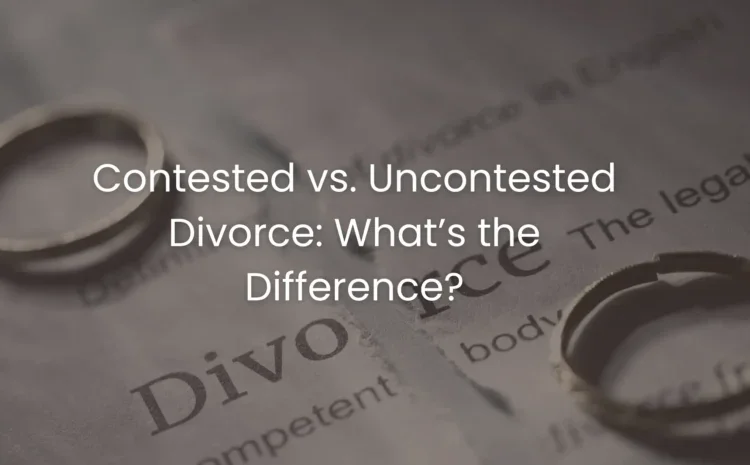Contested vs. Uncontested Divorce: What’s the Difference?
In this Article
What Is a Contested Divorce?
What Is an Uncontested Divorce?
Key Differences Between Contested and Uncontested Divorce
When Does a Divorce Become Contested?
How YY Lee & Associates LLC Can Help
Book a Consultation Today
Frequently Asked Questions (FAQ)
When working with a trusted divorce lawyer in Singapore, one of the first things you’ll need to clarify is whether your case is a contested divorce or an uncontested divorce. While both lead to the legal end of a marriage, the path and complexity involved are vastly different.
Understanding the difference between contested and uncontested divorce is essential—not only for setting expectations but also for choosing the right legal strategy and support.
What Is a Contested Divorce?
A contested divorce occurs when both parties do not agree on one or more key aspects of the divorce. These issues can include:
Division of matrimonial assets (property, CPF, savings, etc.)
Child custody and visitation
Spousal or child maintenance
Contested divorces tend to be more complex and require court hearings, affidavits, mediation, and legal representation. They may also take significantly longer to resolve—ranging from several months to over a year.
That’s why it’s important to work with a skilled Singapore divorce lawyer who can build your case, negotiate on your behalf, and advocate for your best interests in court.
What Is an Uncontested Divorce?
An uncontested divorce, on the other hand, happens when both parties agree on all key terms, including:
The reason for divorce (grounds)
Division of assets and liabilities
Custody and care arrangements for children
Financial maintenance (if applicable)
Uncontested divorces are generally faster, more affordable, and less emotionally draining. It’s still recommended to engage a lawyer to ensure your rights are protected and that all paperwork is filed correctly under Divorce Services in Singapore.
Key Differences Between Contested and Uncontested Divorce
| Aspect | Contested Divorce | Uncontested Divorce |
|---|---|---|
| Agreement | Disagreements on key issues | Full agreement on all terms |
| Time | 6 months to 1+ year | As fast a 3-4 months |
| Complexity | Involves mediation and court | Usually does not go to trial |
| Cost |
Higher due to legal hours | Lower legal costs |
| Stress Level | High — emotionally and legally challenging | Lower — cooperative process |
When Does a Divorce Become Contested?
Even if both parties want to separate, a contested divorce can arise if there’s a disagreement over:
Who should get the marital home
How much one party should receive from joint assets
Who gets custody or how access is arranged
Allegations of adultery or unreasonable behaviour as grounds for divorce in Singapore
In such situations, your lawyer plays a critical role in defending your claims, negotiating fair terms, and guiding you through the legal process. Learn more about how we approach Divorce Services in Singapore.
How YY Lee & Associates LLC Can Help
At YY Lee & Associates LLC, our team of experienced divorce lawyers in Singapore will assess your unique situation, explain your options clearly, and work with you to reach a resolution—whether through peaceful settlement or strategic litigation.
We also assist with:
Book a Consultation Today
Whether your case is contested or uncontested, early legal advice can make all the difference.
Contact YY Lee & Associates LLC to speak with a dedicated Singapore divorce lawyer and get the clarity and support you need.
Frequently Asked Questions (FAQ)
-
A contested divorce is when both parties disagree on key issues like asset division, custody, or the grounds for divorce.
-
Yes, through mediation or negotiation, many initially contested divorces reach amicable settlements.
-
It varies, but most contested divorces can take 6–12 months or more, depending on the complexity and level of dispute.

